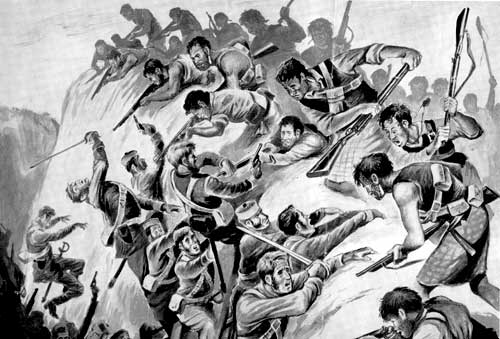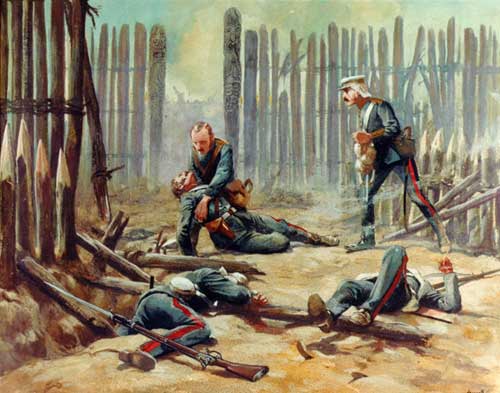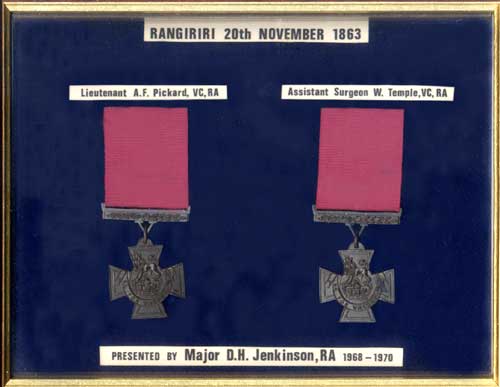On 21st November 1860 "C" Battery 4th Brigade RA under the command of Captain H Mercer embarked at Woolwich on board the freight ship Norwood and sailed for Auckland New Zealand, landing on Tuesday 5th march 1861.
In 1862 the Maoris of the lower Waikato River area (some forty miles south of Auckland) recommenced hostilities and the British were forced to form a defensive line of posts on the Kiaora Hills.
By the end of October General Cameron had at last accumulated sufficient supplies and having acquired two small steamers, was ready to take the offensive. The Maoris withdrew up the river for some twelve miles and occupied a very strong entrenched position at Rangiriri between Lake Waikare and the river Waikato. The stronghold was protected by two deep ditches behind which rose a nine foot high parapet. In the rear was a central redoubt with a a ditch twelve feet wide and a parapet eighteen feet high.
General Cameron proposed to attack this formidable fortress frontally with 800 men, sending another 500 men to intercept the enemy's retreat. With great difficulty two 12 ponders the Battery and a 6 ponder manned by the Royal Navy were brought into action through marshy ground to a position within 600 yards of the entrenchment.
On 20th November 1863 after a ninety minute bombardment, the Infantry attacked and captured the outer line of defenses but failed to capture the redoubt in the rear.

Captain Mercer was then ordered to assault the redoubt with his men, who were only armed with revolvers for the purpose. The attack was held up by the high parapet over which no way could be found. Although Sgt McKay and Gunner Green threw 5 and half inch mortar shells with burning fuses over the parapet, the assault failed since the attackers could not get to close quarters with their enemy. The fiercest enemy fire came from the entrance to the Maori redoubt and it was here that Assistant Surgeon Temple performed a conspicuous "act of courage and devotion to duty by passing this opening for the purpose of attending to the wounded, although the extreme danger of his doing so was pointed out to him, every man but one (Lt Pickard) who had previously attempted to cross having been killed or wounded.
Captain Mercer was mortally wounded, however this gallant effort was not entirely without result, for the next morning the Maoris finding their retreat cut off, surrendered leaving 36 dead in the entrenchment and 183 prisoners.
The British lost forty killed and ninety five wounded.

Assistant Surgeon temple rescues Captain Mercer RA
courtesy of Army Medical Services Museum
In his official despatch, General Cameron reported that the Royal Artillery displayed great daring and intrepidity in their assault, Lt A.F Pickard and Assistant Surgeon W Temple both of the battery were awarded the Victoria Cross.
The award of the Victoria Crosses was Gazetted on 22nd September 1864, the citation reading as follows:-
" For gallant conduct during the assault of the enemy's position at Rangiriri in New Zealand on 20th November 1863, in exposing their lives to imminent danger in crossing the entrance of the Maori keep, at a point upon which the enemy had concentrated their firepower, with a view to render assistance to the wounded and more especially to the late Captain Mercer of the Royal Artillery.
Lt Pickard it is said crossed and re crossed the parapet to procure water for the wounded when none of the men could be induced to perform this service, the space over which he traversed being exposed to cross fire, and testimony is borne to the calmness displayed by him and Assistant Surgeon temple under the trying circumstances to which they were exposed"
